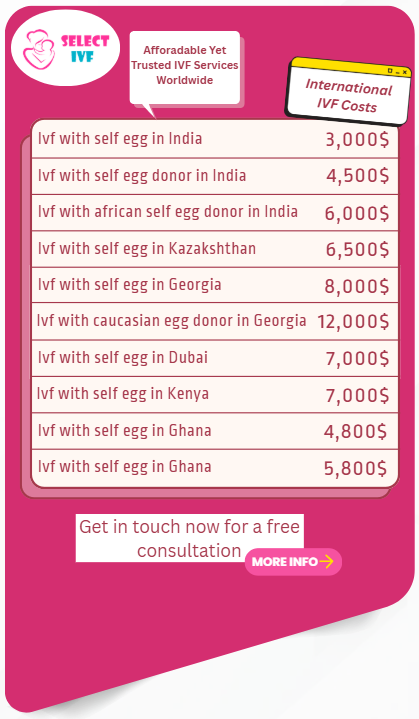Do you need help in managing surrogacy cost in India with a full understanding of the legal process?
Surrogacy is expected to increase at the rate of 5.48% (CAGR) during the period 2025-2033, all due to the increasing infertility cases and growing acceptance of the process over traditional family forms. Over the past decades, surrogacy success rates have been improved and still growing. Many global celebrities have undergone the surrogacy process to have their biological child and live their normal parenthood lives. It shows that surrogacy is a very effective way to consider starting the parenthood journey for infertility couples.
In this article, we will learn and understand Surrogacy, why it’s required by many couples, its types, eligibility and what are its process. We will also learn about the average surrogacy cost in India.

Why should you trust SELECT IVF for surrogacy in India?
- First-stage top counseling sessions
- Premium services and processes
- Highly competent specialists for surrogacy treatment in India
- Sky-high surrogacy success rates in India
- Contact us Email ID: info@selectivf.com
- Call us: +91 8447592299
Understanding the Surrogacy Cost India
Surrogacy is a type of Assisted Reproductive Technology (ART) method. Surrogacy in India is a type of arrangement that involves a surrogate mother, who carries a pregnancy for the other intended couples. The surrogate mother shows her intent to help the intended couple when the intended couple can’t conceive their own.
Not all can opt for surrogacy, there are some eligibility criteria for the intended couples and surrogates to be involved in the surrogacy process.
For this, a legal agreement will be made between both parties for easy flow and management of the surrogacy process. Fertility clinics will help out with the management and coordination of the process, they will also help in legal documentation and agreement. Agreement is necessary for the process as this is to transfer the parental rights to the intended couples in a smooth manner.
Types of Surrogacy in India
There are mainly two types of surrogacy, which are based on the type of relationship between each party involved in the process i.e. Surrogate, the intended couple, and the child born through the surrogacy process. Out of those only gestational is the most preferred surrogacy type in India while the commercial type is banned in India. However, these types are still practiced in India but with the difference in surrogacy cost in India. Here, are the types:
- Traditional Surrogacy: In this type, the surrogate mother’s egg is used for fertilization with the intended father’s sperm or donor sperm in the IVF lab. The surrogate mother will be the biological mother of the child, due to this, it is very uncommon nowadays.
- Gestational Surrogacy: In this type, the Surrogate mother will carry the child which is not genetically related to her. She has the intent of helping other couples to have a child by carrying out the pregnancy in her womb. For this, the intended couple’s egg and sperm are used for fertilization in the IVF lab. In this case, the surrogate will have not any kind of genetic relationship, which is why it is the most preferred type in today’s date.
Altruistic Surrogacy: The government has made altruistic surrogacy in India legal and the most ethical practice of surrogacy in India. In this type, the surrogate mother will not be compensated for her intent of carrying the pregnancy in her womb for another couple. In this, she will be compensated for all the medical bills, pregnancy care & needs, insurance, etc by the intended couple. The surrogate should made her consent on the basis of helping the intended couple to have their child, not based on any monetary purpose. This type of surrogacy has been proved to be effective in terms of surrogacy cost in India for the prospective parents.

Prohibition of Commercial Surrogacy in India
India has been known as the global hub of surrogacy in India, foreigners’ first choice. The country has offered one of the most affordable surrogacies in the world as compared to other countries with the international standard medical infrastructure. India has proved its efficiency with the kind of medical infrastructure with impeccable success rates performance.
Prohibition of commercial surrogacy in India has happened after the Surrogacy (Regulation) Act, of 2021. The bill has introduced changes in the practices of surrogacy in India. Commercial surrogacy has been banned in India, only Altruistic surrogacy has been made legally accepted in the country. There are many cases of surrogate exploitation and child trafficking increases over the different regions of the country. Many fertility clinics across the country had been practicing illegal or unethical practices while selecting surrogates from poor rural areas, usually with a low education background. Her health risk at stake, paid with very low compensation and keeping the large margin by these clinics, has been the cases of exploitation of these women across the country. Due to the increased demand for surrogates across the country, young girls are on the stake of child trafficking. After careful consideration of this, the government has put stricter restrictions on these surrogacy practices, more regulated and made it an ethical practice by considering the needs and rights of both parties involved in this, the intended couples and surrogates.
What are the Permissible Medical Conditions for Surrogacy in India?
Surrogacy is the helpful need of the intended couples who want to have their biological child. Due to their infertility reasons or certain medical conditions, they couldn’t achieve success in conceiving a child on their own. Here is the list of those reasons for them to go to the surrogacy:
- The intended woman could have issues with her uterus such as the absence of a uterus or an underdeveloped uterus, a Hysterectomy, or any uterine malformations.
- The intended woman could have faced repeated pregnancy loss or miscarriage. There could be many medical reasons for it such as hormonal imbalances, autoimmune disorders, chromosomal issues, etc.
- The intended couples have had multiple failed IVF attempts. This could be due to poor-quality eggs or sperm or any medical conditions.
- The intended woman could have some genetic disorder or disease that leads to fertility problems. Genetic diseases can be gene mutations, fragile X permutation, or Kallmann syndrome.
- The intended woman could have some reproductive issues such as Endometriosis, Hydrosalpinx, etc. Endometriosis is the condition of growing similar tissues of the uterus lining outside of the uterus and Hydrosalpinx is the condition of fallopian tube blockage due to some fluids.
Indian Surrogacy Law – 2021
India has passed new laws by replacing the surrogacy law enacted back in 2002, catering to the need of newer needs, and considering the potential rise in the issues of unethical or illegal ways of practicing surrogacy in India.
The Surrogacy (Regulation) Act, 2021 has some new law amendments by allowing more infertility couples to seek surrogacy treatment in India, and by regulating the ethical practice in India. Here, the new laws state that:
- Commercial surrogacy practices are banned while only allowing for the altruistic type of surrogacy as the legal practice of India.
- Certain eligibility criteria for both the intended couples and the surrogate will be discussed in detail later.
- Divorced or single women can also opt for surrogacy in India, eligibility age will be 35 to 45 years.
- Both involved parties i.e. intended couples and surrogates, should be Indian nationals or NRI nationals.
- Only ART Level 2 registered clinics are allowed to perform Surrogacy in India.
- Single men are not eligible for surrogacy.
Amendments in the Law, 2024
Several petitions have been filed in the Supreme Court for amendments by the public. Supreme Court has ordered the government to consider some amendments to the surrogacy practice in the country. The government has finally made some amendments for surrogacy in India.
The Use of Donor Eggs/Sperms: Earlier, the government strictly prohibited the use of donor eggs/sperms in the country, but the government has now allowed seeking surrogacy using Egg donors/Sperms, but only when certain conditions demanded, further added to must use at least one gamete from the intended couple. It means that both gametes should not be used from the donation. The amendments have further added that the Single woman (Divorcee or Widowed) must use her self-eggs and the donor sperm to avail the surrogacy in India.
Eligibility Criteria: Surrogacy in India
Intended Couples
There are some eligibility criteria for the intended couples in order to go for surrogacy. The fertility clinics in Banjara Hills, Hyderabad will check those criteria before recommending the surrogacy method for the intended couples. These are:
- The intended couple should be married for at least 5 years.
- The intended woman should have the age between 23-50 years and the intended man should have the age between 26-55 years.
- The intended couple must have proven documents for their infertility conditions or any medical reasons to go for surrogacy.
- The intended couple must have Indian nationality. Foreign nationality couples are not allowed to opt for surrogacy in India.
- The intended couple must not have a biological child from their previous marriage or any adopted child.
Surrogate
A surrogate mother should meet certain eligibility criteria in order to be involved in surrogacy for the intended couples. The surrogacy clinics in Banjara Hills, Hyderabad will check those criteria before recommending the surrogacy method for the intended couples. These are:
- The surrogate should have an age between 23-35 years.
- The surrogate should be a close relative of the intended couple.
- The surrogate should be doing surrogacy services in order to help the intended couple to have a child.
- The surrogate should be married and have a biological child from her marriage.
- The surrogate should not have a history of being a surrogate in the past.
- The surrogate should meet the physiological and fitness test and must provide a certificate for it.
- The surrogate must show her self-consent and must be willing to do it without any monetary compensation.
- The surrogate cannot donate her gamete for the surrogacy.
- General Health Requirements:
- Normal Health Conditions i.e. physical and mental, healthy BMI (Body Mass Index), non-smoker & non-alcoholic lifestyle, not having any medical issues, passing all psychological evaluation tests, and at last not having any sexually transmitted disease.
The Approval Process for Surrogacy in India
The approval process for surrogacy in India will quite seem to be hectic to you but it is the most important step to begin with the surrogacy process in India. It will keep you safe from the legal complications later. You need to apply to the appropriate authority and get their approval for the surrogacy process to begin with. You need to provide the infertility certificate, which will be issued by your registered infertility specialists. Further, a legal agreement is a must to do things in the entire process. The agreement will be made between the intended couples and the surrogate. The legal agreement will include the terms and conditions of the surrogacy, compensation (includes medical fees, insurance, food & care expenses, and travel & accommodation). However, these legal processes and agreements have added up to the overall surrogacy cost in India.
These things will keep the rights of each party protected while making sure the ethical practice of the surrogacy process.
How is the Surrogacy Process Conducted in India?
Surrogacy involves a series of steps or actions in order to be taken by fertility specialists, the intended couple, and the surrogate. The fertility center plays a major role in managing and coordinating the whole surrogacy process. This makes the surrogacy process easier and smoother for the intended couple as this can be emotionally and physically challenging. Here, is the step-by-step process:
- Medical Evaluation: The surrogate and the intended couples will go through medical examinations for compatibility checks for the process. The surrogate will be examined for physiological & psychological evaluations so that she’s mentally fit for the process.
- Legal Agreement: A legal agreement will be signed between both the party i.e. intended couple and surrogate in order to have the clarity of the process. This contract includes key components of the agreement such as terms & conditions, rights & responsibilities of each party, insurance coverage of the surrogate, and parental rights of the child after delivery.
- Artificial Fertilization- IVF: In this, the intended couple’s egg and sperm sample will be collected. It can be from donation as either donor eggs and sperm are legal in India but it should meet some conditions. After collection, artificial insemination (fertilization) will be done by using IVF technology. An embryo will be developed in the IVF labs or through the ICSI method.
- Embryo Transfer: At the blastocyst stage of embryo development, the selected good-quality embryo will be then placed in the surrogate’s uterus through a simple and safe procedure.
- Pregnancy & Child Birth: The transferred embryo will later lead to pregnancy in the surrogate’s body and then the child will develop inside her womb for 9 months and will be monitored regularly until the birth of the child.
- Parental Rights: After the child’s birth, a legal procedure will be carried out. In this, parental rights will be transferred to the intended couples. Then, the intended couple will be the legal guardian of the child.
What are the Chances of Success With Surrogacy in India?
Its wrongly to say that success of surrogacy would be 100% but due to medical advancements and technology with expertise of the infertility specialists in the infertility field, has made the surrogacy success rates in India on an average basis would be ranges between 70-80%. Many good fertility centres offering good success rates, which can add an increase to the overall surrogacy cost in India.
This surrogacy process is entirely dependent on various factors, so the success rates matter on these factors. These factors include the intended couple and surrogate mother’s age, the donor’s age (if donor gametes), fertility centers, the expertise of infertility specialists, etc. The infertility conditions of the intended couples also matter a lot for the success rates.
What will be the Cost of Surrogacy in India on an Average Basis?
The average surrogacy cost in India ranges between ₹15L – ₹25L. However, the breakdown cost key components which makes the overall cost this much.
- Key Components of Surrogacy Cost in India
It is important to note that the these costs may vary from clinic to clinics.
- Medical Expenses: Medical examinations & tests, IVF/ICSI procedures, Embryo transfer, injections cost, Gametes collection and fertilization process, etc.
- Surrogate Compensation: Medical fees, insurance coverage, food & prenatal care expenses, and travel & accommodation, Delivery charges, etc.
- Expert Fees: expertise & experience, appointments and counseling sessions, etc.
- Genetic Testing: PGT/PGD, if required.
Factors Affecting the Overall Surrogacy Cost in India
These below mentioned factors are contributing the variations in the surrogacy cost in India.
- Location & Reputation of the clinic.
- Success Rates and medical infrastructure offered by the clinic.
- Location of the city or region in the country. Top tier cities will have the higher chances of increased cost markup.
- Surrogate compensation
- No. of IVF Cycles attempt for successful conceiving.
- Cost Breakdown
These are the major components of the overall surrogacy cost in India:
| Cost component | Cost Range(On Average) | It includes these: |
| IVF Treatment | ₹1.5 – 2.5L per cycle | This covers medical procedures and medications for egg retrieval and fertilization |
| Surrogate Compensation | ₹4 – 8L | This covers the compensation to the surrogate mother |
| Agency & Clinic Fees | ₹1 – 2.5L | This covers all the expenses for a surrogacy agency or fertility clinic. |
| Legal Fees | ₹50K – 1L | This covers Lawyer’s fees for drafting contracts between parties |
| Legal approvals | ₹4- 6L | This covers the cost of legal approvals and compliance and NOCs before starting the medical procedure. |
| Other Costs | ₹1 – 2L | This covers additional expenses like medical insurance, embryo freezing, screening tests, etc. |
Why to Choose Select IVF for Surrogacy in India?
Select IVF has been a major player in the field of providing fertility treatment. Select IVF has the mission of empowering families to achieve successful parenthood, who are facing hopelessness with their infertility conditions with their professionalism utmost care, and effective treatments.
They have been working to provide the best assisted reproductive technology such as advanced infertility treatments such as Surrogacy, IVF, ICSI, IUI, Egg & Sperm Freezing, etc in more than 10 countries worldwide.
Here, are the considering factors for choosing Surrogacy in India:
- Providing effective treatment for both Male & Female infertility.
- Surrogacy, IVF, IUI, ICSI, egg & sperm freezing, egg donor, etc at reasonable costs.
- 24 hours for all 7 days service, caters to emergency services also.
- A huge team of infertility specialists specializes in major infertility conditions
- Patient-centric effective treatment with ethical practices.
You can read more on our website https://selectivf.com/ or consult on call +91-8447592299 or email your query to info@selectivf.com
Conclusion
This article has helped you to understand the overall surrogacy process in India in detail. Surrogacy has been practiced for long back in time, it’s not a new method but with the help of medical advancements, it’s now possible to have your child biologically related to both the intended partners.
Many good fertility centres across in India has been offering affordable options for the process, so overall surrogacy cost in India is very reasonable. Do consult today with a good fertility clinics or experts, negotiate or make a good deal for the process without compromising the success rates.
FAQs for Surrogacy Cost in India
1. How Long Does the Surrogacy Process Take?
The surrogacy process takes a minimum 1 year of time, in which 9 months is for pregnancy care of the surrogate till the delivery of the child. It is important to have patience for the process as sometimes it takes multiple IVF cycles for successfully conceiving.
2. What are the Documents Required for Surrogacy in India?
The documents which are required: proof of marriage, age certifications, medical & eligibility certificate from the District board, medical indication certificate from the Distric court, and insurance & medical fitness certification of the surrogate, etc.
3. How is surrogacy regulated in India?
Yes, the surrogacy strictly regulated by the government of India. The surrogate and the intended couples must make an agreement or legal contract before starting the process. Generally, this process is managed by fertility clinics.
Read Also:
- Prominent IVF Clinic Near Dwarka: Select IVF – Bringing Dreams to Life
- Ferticity Delhi: A Trusted Partner in Your Fertility Journey with Select IVF
- Indira IVF Borivali Cost: A Comprehensive Guide to IVF Treatment
- Nova Fertility Andheri West: A Leading Destination for Fertility Treatments with Select IVF
- Comprehensive Guide to Jilla IVF Andheri West: A Select IVF Center
- Gaudium IVF Best IVF Centre in Khar Mumbai: Leading the Way in Fertility Treatment
- Ankoor Fertility Clinic Mumbai: A Premier Destination for Fertility Treatment in Mumbai









